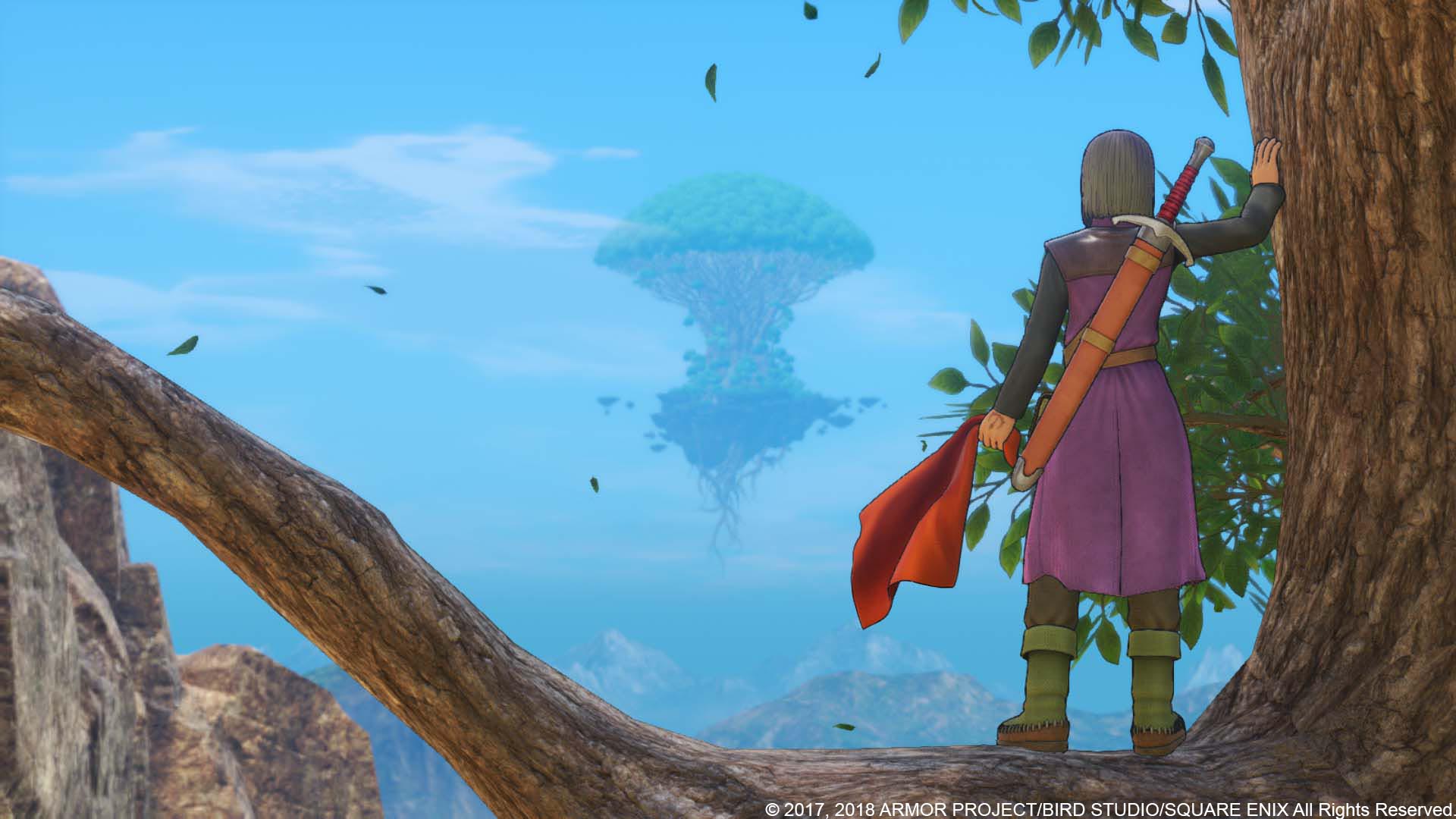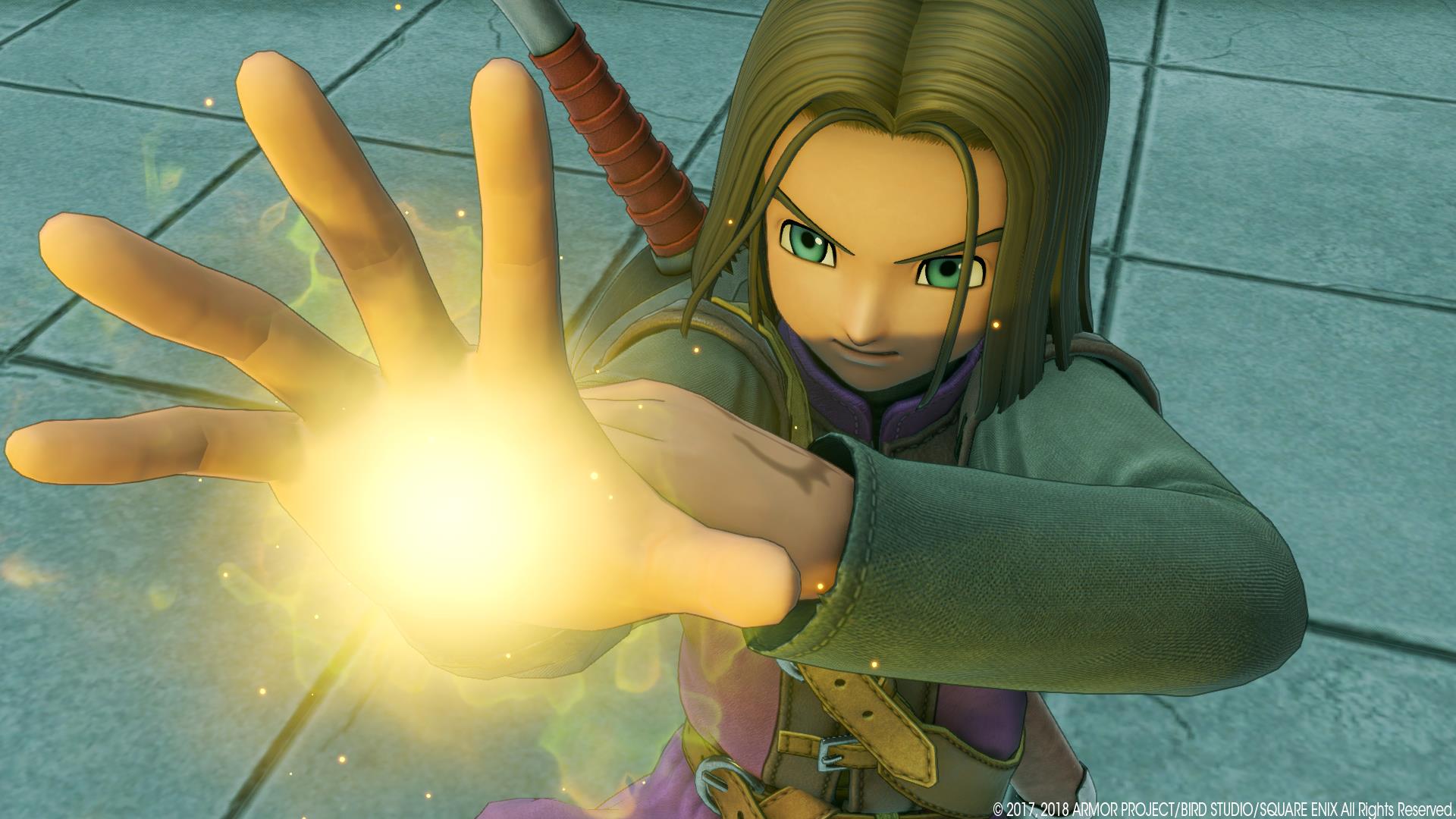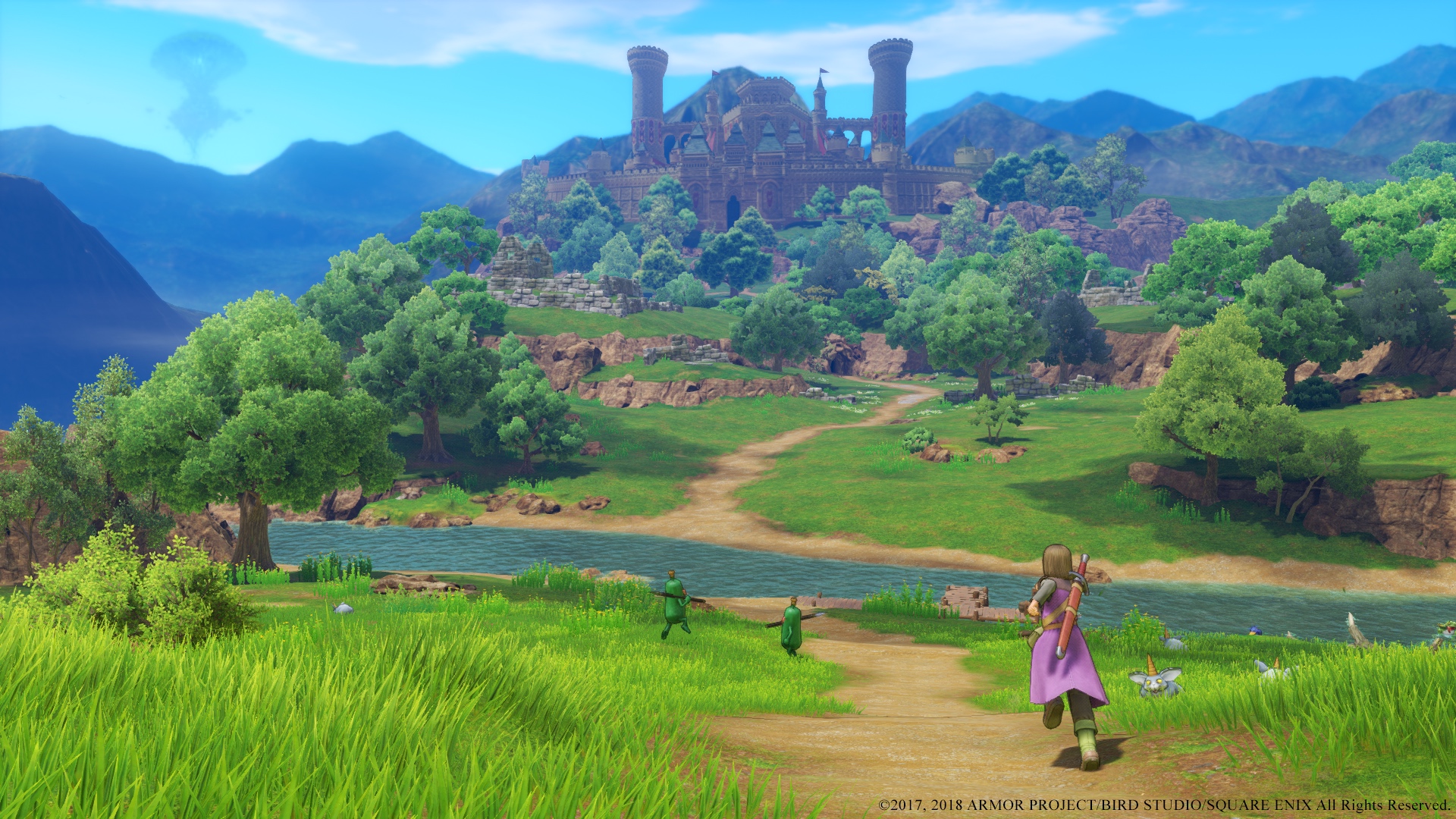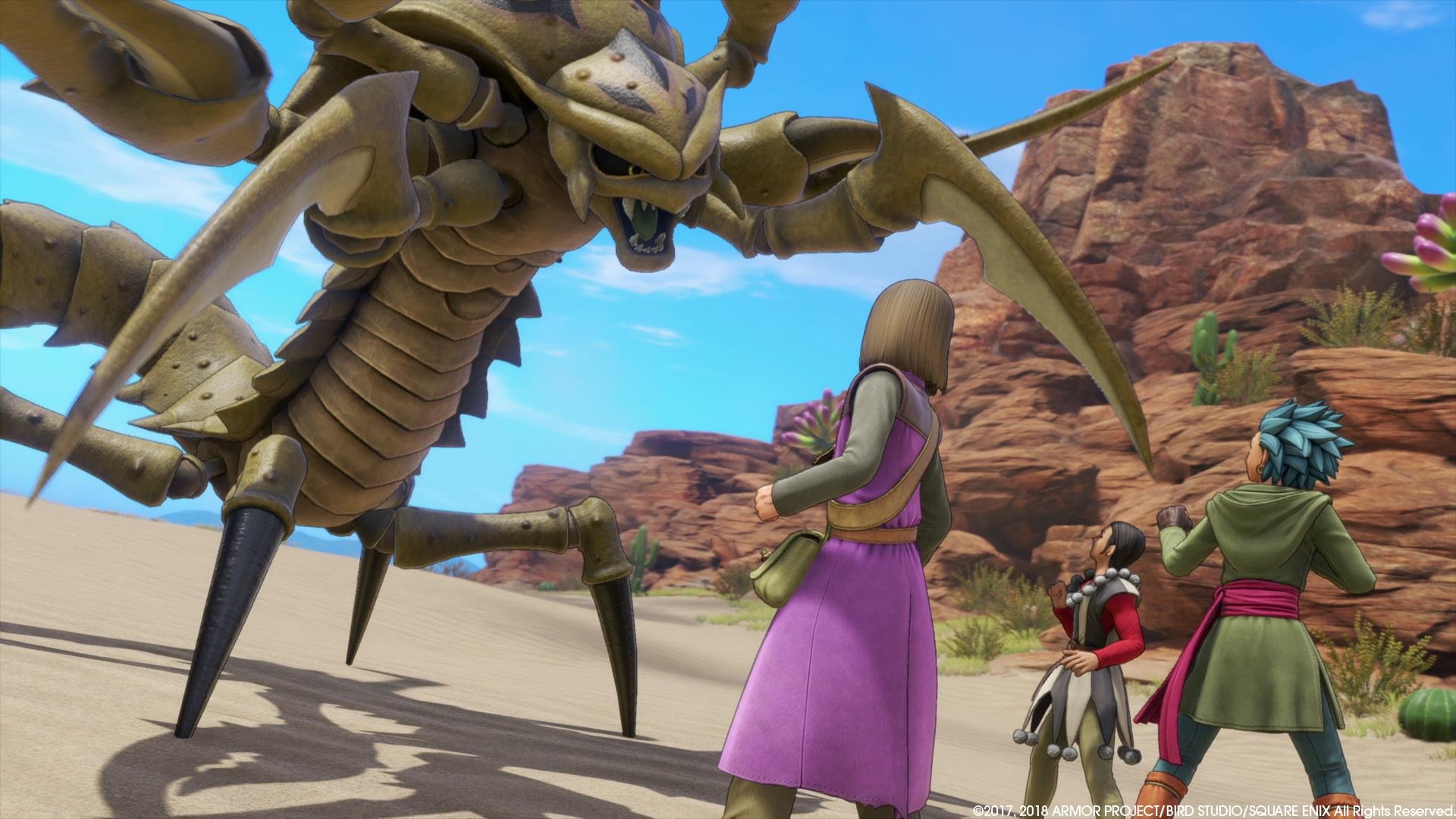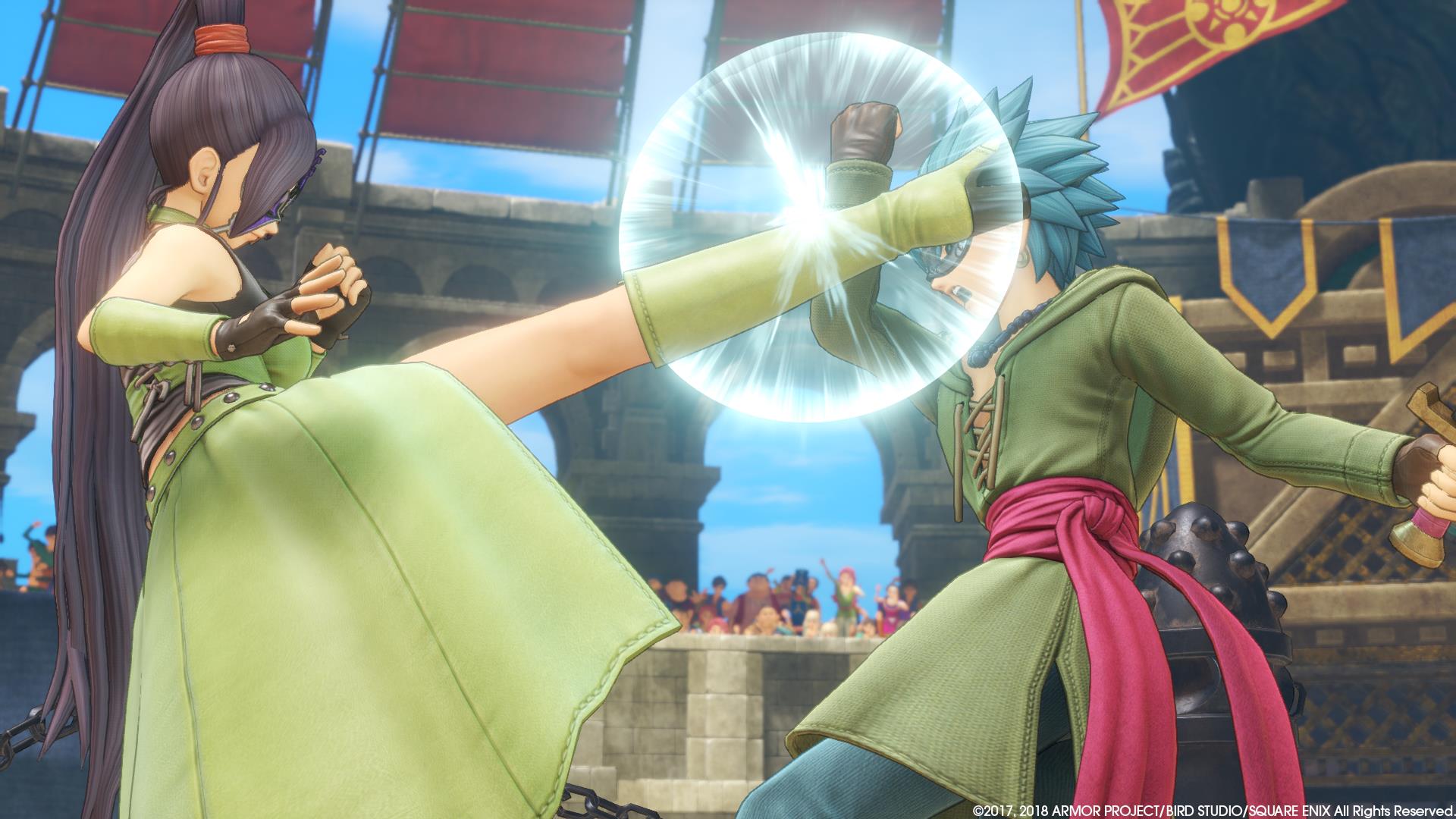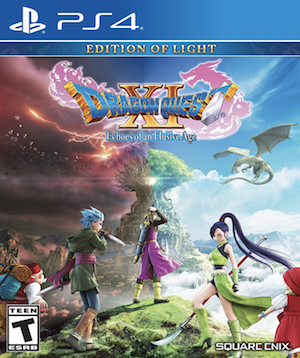
To call Dragon Quest the grand daddy of JRPGs would not be an overestimation of the franchise’s achievements. What we now see as staples and tropes of the genre were, more than three decades ago, revelatory ideas that were originally implemented in the very first Dragon Quest title, which laid down the blueprint that games of its ilk follow even to this day. But while the series’ legacy is unquestionably massive, and its consistency over a period of many years plain for all to see, the question that faces Dragon Quest XI, the latest and long-awaited instalment in this venerated franchise, is- what makes it special?
Sure enough, Dragon Quest XI’s tendency to play things by the book a bit too much will be one of the criticisms that will be levelled at it most often. But a lack of originality, I think, is something that stings the most when a game uses it as a crutch- as a way to crawl through its creative deficiencies, or its lack of polish, or both. Dragon Quest XI sticks closely to a tried and tested formula, yes, but in its particular case, that is much easier to forgive, because though it does do that, it also constantly displays an immense mastery over and a thorough understanding of what makes for a truly great JRPG.
"Dragon Quest XI sticks closely to a tried and tested formula, but in its particular case, that is easier to forgive, because though it does do that, it also constantly displays an immense mastery over and a thorough understanding of what makes for a truly great JRPG."
Take its story, for instance. Throughout the course of its long, winding journey, Dragon Quest XI hits a lot of the narrative beats that you would expect it to (and a few that, to be fair, you wouldn’t), and while you can certainly fault it for its unwillingness to tread new ground, you simply have to admire it for its excellent execution. Much of that is down to the game’s excellent pacing. While most games of its ilk tend to get bogged down in heavy expository sequences, or stretches and segments of story that simply go on far too long, Dragon Quest XI likes to keep things moving. You constantly find yourself in new situations, travelling to different exotic locations, meeting new, whimsical characters.
While there is a larger narrative that determines the direction of the entire experience at large, the game keeps moving through shorter, well-told, satisfying stories at a slick, rapid pace, all of which differ from each other quite a lot. The tale woven here evokes a very familiar feeling of a globe-trotting journey across a magical, fantastic land- a brand of storytelling that is by no means original, but is put to great use here nonetheless. Every town, city, or location you visit looks unique and immediately arresting. From desert cities and canal thoroughfares to colonial-style towns and lazy, isolated villages, each new area you visit feels distinct, not just in terms of visual design, but also the stories they tell and the collective personality they displays as distinct regions of the world, from their own unique cultures to even their accents. Granted, much of this is caricaturedized in keeping with the silliness and light-hearted nature of the rest of the game, but it all contributes greatly towards the game’s strong identity. And even in spite of so much variation, the entire larger world of Dragon Quest XI still feels coherent, with a strong sense of place, which it accomplishes through simple yet effective world building.
What also helps is that the main cast of characters at the heart of the story is absolutely excellent. Each character is a well defined personality, and each of them is brought to life by outstanding voice acting – for the most part, at least – and excellent writing that is translated surprisingly well thanks to strong localization. A few of the characters you will meet throughout the journey are absolutely brimming with an excess of personality, and they certainly leave a mark. This is a game that has a lot of moments with heart, and a lot of moments with warm humour, and while there are times when it does stumble a bit, it mostly manages to keep your attention for the entirety of its long duration, which is an achievement in and of itself. While you shouldn’t expect a riveting tale of intrigue and vast complexities, Dragon Quest XI accomplishes what it sets out to do very well.
"While you shouldn’t expect a riveting tale of intrigue and vast complexities, Dragon Quest XI accomplishes what it sets out to do very well."
The same can also be said of the game’s combat. Dragon Quest XI features a conventional turn based battle system, that you’ll be all too familiar with if you’ve ever played a classic JRPG. You’re given the ability to move around the camera and the characters freely during battle, but this is little more than stage dressing, and doesn’t have any mechanical impact on battles. While the combat might seem a bit too dull or simplistic in the initial hours where you’re limited to just controlling one or two party members, things quickly become more interesting as the game progresses. In typical JRPG fashion, you’re restricted to having just four party members active at any time during combat, but you also have the ability to switch every one of your characters in and out of battles on the fly, and this constantly keeps things interesting and engaging.
What also helps is that each of the characters in your party has their own advantages and disadvantages, and clearly defined strengths and weaknesses. Their specilizations in different kinds of weapons, their individual stats, the amount of damage they can take or deal, the kinds of supporting spells and abilities they each have, how effective they are with magical abilities, and what kind of status moves they have are just a few of the factors that make them all equally viable options in battles, depending on the situation. This is further compounded by the fact that they each have their own unique skill trees as well, which gives you greater options of customization to grow each character in their own specific ways. Each party member also gains experience and levels up regardless of whether or not they’re active in battle, so you never have to worry about anyone being left behind, or be forced to grind to bring any of them up to a certain level. As a result, they all feel meaningfully different from one another, and none of them ever really end up feeling redundant or underutilized. The fact that the combat system encourages you to keep changing the composition of your party keeps things from getting monotonous.
There are also Pep moves- every once in a while, characters in combat get Pepped Up, which is a heightened state of increased stats. As long as a character is Pepped Up, they can both deal and take more damage (or have better healing powers, as the case may be), and receive boosts to other stats. However, you can also choose to immediately use up their “Pep” to unleash a single, significantly more powerful move, many of which are presented through flashy, spectacular mini-cutscenes (which can be skipped, so you don’t have to watch them repeatedly). There’s variety in these moves, called Pep Powers, as well, as they can be anything from offensive moves, to defensive ones, to ones that provide stat buffs, to supporting attacks, and so on. You can also combine two or more characters to unleash combo Pep Powers, and as your characters level up and grow stronger, they’re constantly learning new Powers as well (you can, of course, also manually teach them new ones through their individual skill trees).
"While the combat might seem a bit too dull or simplistic in the initial hours where you’re limited to just controlling one or two party members, things quickly become more interesting as the game progresses."
Something else that bears mentioning is the enemy design. If you’ve played even a single Dragon Quest game before, you’ll probably be familiar with many of the monsters you’ll face in battle here, but their rendition in Dragon Quest XI particularly makes them a treat to discover and behold regardless. While their iconic and endearing designs obviously retain their core strengths, what makes them truly stand out is their animations. From the way they move about while they’re idle, to the way they attack, to how they react when they miss their attacks, to how they animate when they die, every monster in Dragon Quest XI has numerous delightful animations that lend a great deal of charm and personality to both, the monsters themselves and the game in general.
What is somewhat disappointing, though, is that while Dragon Quest XI’s combat sets itself up perfectly for an excellent level of strategy and variety, it often fails to capitalize on that potential due to its unchallenging nature. Switching up your party to meet particular challenges, for instance, would have been far more meaningful if the game leveraged that well enough by actually throwing tough encounters your way that forced you to truly think about the composition of your party. Hardly any boss battle in the game provides a challenge that is appropriate to the story, or the context of what’s going on in the game at that moment, or even what some of the bosses look like. That’s not to say the game is an absolute breeze – mindlessly repeating the same attacks on enemies might not work in several situations, especially in the game’s final third – but a lot of the times battles were over far more quickly than I expected, almost to the point of being anticlimactic. Unlike older Dragon Quest games, spots where you can save and rest up your party members are also littered throughout the world with far more frequency than what fans of the series might be used to, which also takes the edge off a little bit. There is, to be fair, an option for a harder difficulty setting in the form of the Draconian Mode, which comes highly recommended.
The one area where Dragon Quest XI does provide a familiar bit of challenge – at least more than its combat – is its economy. Unlike a lot of other RPGs, spending your hard earned money to buy new equipment and weapons actually requires some thought. Especially during the game’s first twenty-five to thirty hours, the amount of money you have at your disposal is limited, and buying the best possible gear for each and every one of your party members isn’t always an option. You’re never totally strapped for cash, but you do have to think about where you urgently need to invest, and where you can probably hold off on buying upgrades.
"What is somewhat disappointing, though, is that while Dragon Quest XI’s combat sets itself up perfectly for an excellent level of strategy and variety, it often fails to capitalize on that potential due to its unchallenging nature."
However, purchasing it from shops isn’t the only way to get better gear. Dragon Quest XI also lets you forge your own stuff via a forging mini game of sorts, which is surprisingly robust and enjoyable. The game allows you to pull out a portable forge at each and every one of its campsites in the overworld, which you can then use to craft or improve your weapons, armour, or equipment. This mini-game requires you to hammer away at various segments of whatever it is you’re crafting within certain given limitations. It’s very easy to get into, and as the game progresses, it keeps adding small yet significant new layers on top of it. It doesn’t ever become overly complex, and constantly remains fairly accessible, but also asks that you pay attention. It’s a nice distraction, and over the course of my playthrough, it became my primary method of acquiring new gear, or improving what I already had.
Crafting materials and resources are obviously needed to be able to create things using the mini-forge (or the Fun-Sized Forge, as the game calls it), which also proves to be an excellent foil for the game’s exploration aspects. Unlike most games you see in today’s day and age, Dragon Quest XI doesn’t have a vast, seamless open world that features almost a staggering amount of explorable areas, but there’s plenty of reasons and opportunities to stray from the critical path, especially when the game provides additional methods of traversal further down the line. Coming across rare materials or even powerful gear as a result of exploration almost always feels rewarding. There are also collectibles in the game, which come in the form of mini-medals- collecting these nets you with interesting rewards at regular intervals, which also provides that extra bit of motivation for exploring the nooks and crannies of the game’s world, whether that’s within cities and towns or out in the overworld.
That said, the game doesn’t ever get too overbearing with vast open landscapes that are littered with excessive branching paths or optional areas, and this relative simplicity as far as wandering off the beat path goes provides a nice balance. Exploration is always an option, but in keeping with its fast-moving nature and brisk pacing, Dragon Quest XI makes sure that it never gets in the way of its core experience. The fact that traversal can also be sped up considerably by holding down the right trigger, no matter what your method of transportation might be, also helps a great deal, as does the inclusion of an incredibly convenient fast travel system. Every once in a while, Dragon Quest XI also lets you ride on (or in) certain monsters you come across, which first have to be defeated in combat. From mechanical beasts to giant hornets to creatures that can crawl up walls to a couple others that are best left unspoiled, each of these provide their own unique styles of traversal, and can oftentimes let you access branching areas that you wouldn’t have been able to access otherwise. Just as it is with exploration in general, these are short sections that veer off from the critical path momentarily, but they almost always mete out meaningful rewards, and as such usually feel worthwhile and rewarding.
"Exploration is always an option, but in keeping with its fast-moving nature and brisk pacing, Dragon Quest XI makes sure that it never gets in the way of its core experience."
However, while Dragon Quest XI isn’t as exploration-heavy as many other games of its kind are, that doesn’t mean it’s lacking in terms of content. No, quite the opposite, in fact- it’s overflowing with it. Just the main story in Dragon Quest XI can take roughly 70 hours to see through, while there’s plenty of side activities to indulge in as well. From a casino where you can sink a surprising amount of hours into everything from card games to slot machines, to a horse racing track, to entirely optional areas in the world that you can just skip altogether should you choose to, there’s a lot of stuff here that can provide you with distractions. There’s also over fifty side quests on offer, but they mostly tend to be little more than fetch quests, and the rewards you get for completing them aren’t always worth the effort. Most notably, though, once the credits have rolled, Dragon Quest XI still has plenty of content to offer. Fans of the series would expect the game to have meaningful post-game content that is properly story-driven, and with 15-20 hours of excellent endgame content, Dragon Quest XI certainly does not disappoint. Without getting into any spoilers, carrying on your playthrough after the final credits have rolled is probably a good idea.
While the combat and story in Dragon Quest XI can be described as unoriginal but expertly executed, the one area where the game manages to truly stand out above all others is its visuals. Simply put, this is one of the most strikingly beautiful games I’ve played in years. Dragon Quest XI employs the same cel-shaded aesthetic that the series has become synonymous with, which is powered by the excellent, immaculate art of the legendary Akira Toriyama. The visual splendour and sheer variety of designs of the numerous locations you visit throughout the game are things I’ve already touched on, but it simply cannot be stressed enough- around every corner is a beautiful vista to behold, a breathtaking piece of scenery to absorb. From its sweeping views of vast landscapes to even the finer details, like the way the sun’s rays bounce off beautiful bodies of glimmering water, Dragon Quest XI’s visuals can take your breath away. There are a few instances when the game shows noticeable texture pop ins, while instances of invisible walls can also break the game’s otherwise incredibly strong immersion just a little bit, but in the larger scheme of things, both these issues are relatively easier to ignore.
As good as the game’s visuals and presentation are, though, they’re often let down a little bit by its soundtrack. Dragon Quest has historically been known for having excellent music, and Dragon Quest XI reuses a lot of the tracks fans of the series have grown accustomed to over the years. That, in and of itself, isn’t really much of an issue- even though the game does seem to cycle through only a handful of songs for the entirety of the experience. What hurts the music is the fact that the OST in Dragon Quest XI isn’t orchestrated. As such, the music, which could otherwise have sounded appropriately catchy and grandiose, ends up sounding like a generic synthesized imitation, and often feels like it’s at odds with the game’s otherwise strong presentation.
"Simply put, this is one of the most strikingly beautiful games I’ve played in years."
All said and done, Dragon Quest XI is a stellar game that displays a great command of the ins and outs of its genre the way few other games do. What it lacks in originality, it more than makes up for with its confident execution of ideas, showing that a game doesn’t need to be revolutionary or the freshest thing on the block to be an incredible experience. With a memorable cast of characters, a well-told, briskly paced story, stunning and vibrant visuals, and a beautiful and extremely varied world as its setting, Dragon Quest XI serves as yet another excellent instalment in this amazingly consistent franchise.
This game was reviewed on the PlayStation 4.
Displays complete mastery over what makes for a great JRPG; A well told, well paced story; Diverse, interesting locations; Great cast of characters; The main characters have solid voice acting, for the most part; Strong localization; Meaningful party management and Pep Powers make combat a lot of fun; Enjoyable exploration that yields worthwhile rewards; Forging mini-game is surprisingly fun; Brimming with content; Stunning visuals and presentation.
Lack of originality might be an issue for some; Unchallenging combat and boss fights; MIDI soundtrack; A few texture pop-ins.









